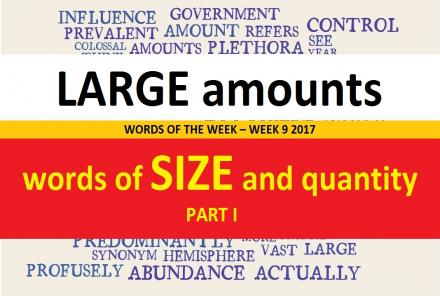
Words of the Week – WEEK 13 2017
INDIFFERENT - If you're indifferent about something, you don't care much about it one way or another. You might feel indifferent about politics, changing the channel whenever the TV news comes on.
ILL INFORMED - “to be ill informed” – this is a really nice way of saying “you don’t know what you are talking about”. Imagine having an argument with a colleague and instead of saying you are being stupid, use say “you have been ill informed”.
CLEAR AND CONCISE - To be “clear and concise” – if you want to have an expression to mean completely clear, transparent and straight to the point then use concise. A police report needs to be concise about facts and evidence and it needs to be written clearly, so it has to be clear and concise.
To call someone homeless or a beggar is one thing however there are other terms which can also be used. Here are a few terms for homelessness:
- VAGRANT- A vagrant is someone who is poor and homeless and wanders from place to place. This term more applies to people (usually in groups) that live on streets that you see travelling on public transport or in other public areas usually consuming alcohol or other substances. They are not beggars, they instead live off the streets, petty criminals or charity.
- DESTITUTE - When you think of the word destitute think more than poor. If people are truly homeless and sleep on the streets on cardboard or only sleeping bags, they are destitute. Vagrants usually have a place to lay their heads, however if you are a destitute you don’t even have that. Destitute can really only rely on begging.
- IMPOVERISHED - Impoverished describes being extremely poor in a way that you cannot afford an appropriate level of food or necessities. People, farms, land and countries can all be impoverished. So, when you use the term to describe someone that is impoverished it does not necessarily refer to homelessness or vagrancy, but to be lacking basic necessities to live/exist properly.
PERUSE – to peruse means to read or examine something carefully in order to take not of the details. You can peruse a contract or a project plan. I always when sending my resume write “please find attached my CV for your perusal”.
AMEND – to amend is a word that keeps coming up in sessions. If you need to change a COMPLETED OR FINALISED (generally written) plan, document, procedure or project, instead of using boring old “change” use amend. In law, lawyers amend contracts, laws, and documents. “we have to make some amendments to our existing contracts with suppliers”. NB if the item has not been finalised or finished, then use the word “revise”.
REVISE –to revise (or to do a revision) is to change, alter or improve a preliminary draft of a written text or plan. It closely is connected to the word review, whereas review implies just looking over something, revise means to review with the intention of actually making changes. Before executing a plan or project, people must revise it many times until it is perfect. “we need to revise our projections given recent shortcomings in revenue”. “Your PowerPoint presentation has some factual errors, please make the necessary revisions it before presenting it”.
OBTUSE – Obtuse is a great adjective to describe someone acting out of order, either in terms of acting irrationally or if they are slow on understanding a point. To give you an idea of where to use it, Jack White inserted it in a song to describe how his ex-girlfriend was acting while they were breaking up, and at work if you want to describe someone that is acting against you, you can refer to them as being obtuse.
ANIMOSITY - Animosity is hatred dressed up nicely. You generally “hold/have animosity toward” someone. I still hold a lot of animosity toward my old boss who had the habit of belittling his employees.
GET ON WITH something - to “get ON with” has two great meanings:
- Firstly, it can be used as an expression to mean get back to what you were doing previously (ie get back to work). If I tell my students to “GET ON WITH IT” then I am telling them to continue with what they were doing.
- Secondly, it can be used as a question to mean how are you progressing, ie “How are you getting ON with your report” = a request for an update.
- (Note not to get confused with “getting ALONG with SOMEONE” which means that you are establishing a friendship or a good rapport exists).
COMPLACENT - Someone who is complacent is neglecting their duties or themselves. The word literally means to become overly content. In essence it means that you become so over content with what you are complacent about that you stop caring about it. If eat lots of junk food and do no exercise you have become complacent about your health. If you get complacent about work errors are more likely to occur.
Economic vs Economical – this is important and comes up often. If something is inexpensive it is economical, if you are talking about economics it is “economic”. So it is an economic crisis, not an economical crisis.
UNDERMINE – if someone undermines you think of them pulling the carpet from under your feet. To undermine literally means to dig a hole underneath something, making it likely to collapse. But we more often use the word to describe sabotage or the act of weakening someone else's efforts. “Do not undermine my authority!”.
BUFF is the word of the week: If you’re a movie buff, you’re a film fan! If you’re “IN THE buff”, you’re naked. If you are “buff”, you have big muscles and muscle tone, and finally, as a verb “to buff” is to polish.










